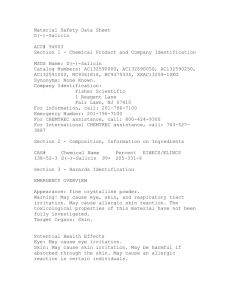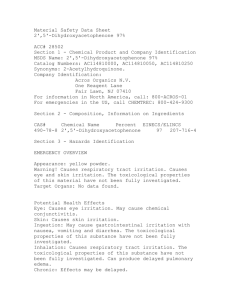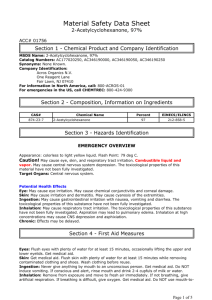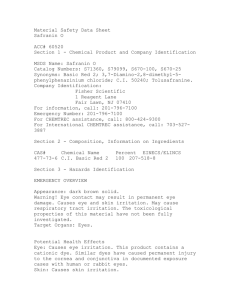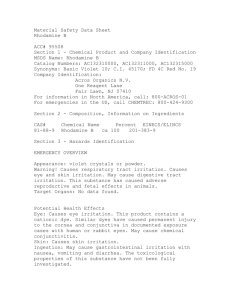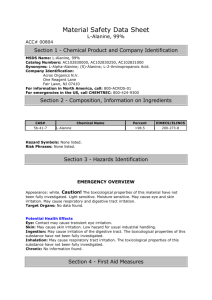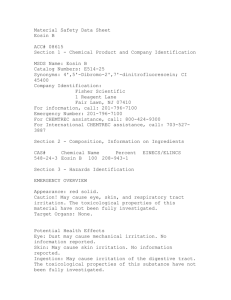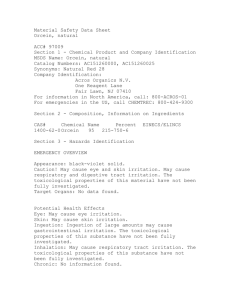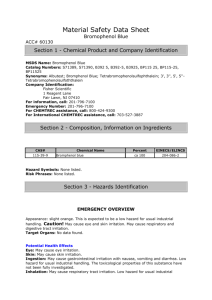4-BROMOANILINE
advertisement
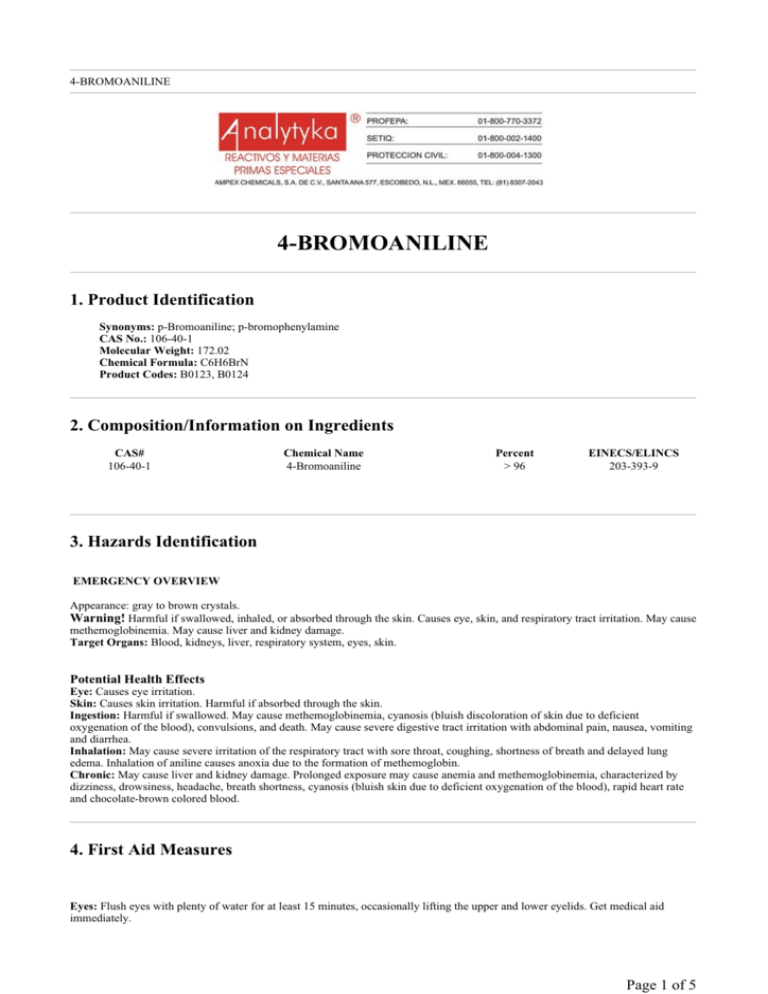
4-BROMOANILINE 4-BROMOANILINE 1. Product Identification Synonyms: p-Bromoaniline; p-bromophenylamine CAS No.: 106-40-1 Molecular Weight: 172.02 Chemical Formula: C6H6BrN Product Codes: B0123, B0124 2. Composition/Information on Ingredients CAS# 106-40-1 Chemical Name 4-Bromoaniline Percent > 96 EINECS/ELINCS 203-393-9 3. Hazards Identification EMERGENCY OVERVIEW Appearance: gray to brown crystals. Warning! Harmful if swallowed, inhaled, or absorbed through the skin. Causes eye, skin, and respiratory tract irritation. May cause methemoglobinemia. May cause liver and kidney damage. Target Organs: Blood, kidneys, liver, respiratory system, eyes, skin. Potential Health Effects Eye: Causes eye irritation. Skin: Causes skin irritation. Harmful if absorbed through the skin. Ingestion: Harmful if swallowed. May cause methemoglobinemia, cyanosis (bluish discoloration of skin due to deficient oxygenation of the blood), convulsions, and death. May cause severe digestive tract irritation with abdominal pain, nausea, vomiting and diarrhea. Inhalation: May cause severe irritation of the respiratory tract with sore throat, coughing, shortness of breath and delayed lung edema. Inhalation of aniline causes anoxia due to the formation of methemoglobin. Chronic: May cause liver and kidney damage. Prolonged exposure may cause anemia and methemoglobinemia, characterized by dizziness, drowsiness, headache, breath shortness, cyanosis (bluish skin due to deficient oxygenation of the blood), rapid heart rate and chocolate-brown colored blood. 4. First Aid Measures Eyes: Flush eyes with plenty of water for at least 15 minutes, occasionally lifting the upper and lower eyelids. Get medical aid immediately. Page 1 of 5 Skin: Get medical aid. Immediately flush skin with plenty of water for at least 15 minutes while removing contaminated clothing and shoes. Wash clothing before reuse. Ingestion: Do not induce vomiting. If victim is conscious and alert, give 2-4 cupfuls of milk or water. Never give anything by mouth to an unconscious person. Get medical aid immediately. Inhalation: Get medical aid immediately. Remove from exposure and move to fresh air immediately. If not breathing, give artificial respiration. If breathing is difficult, give oxygen. Do NOT use mouth-to-mouth resuscitation. Notes to Physician: For methemoglobinemia, administer oxygen alone or with Methylene Blue depending on the methemoglobin concentration in the blood. 5. Fire Fighting Measures General Information: As in any fire, wear a self-contained breathing apparatus in pressure-demand, MSHA/NIOSH (approved or equivalent), and full protective gear. During a fire, irritating and highly toxic gases may be generated by thermal decomposition or combustion. This material in sufficient quantity and reduced particle size is capable of creating a dust explosion. Extinguishing Media: Use extinguishing media most appropriate for the surrounding fire. Flash Point: Not applicable. Autoignition Temperature: Not applicable. Explosion Limits, Lower:Not available. Upper: Not available. NFPA Rating: (estimated) Health: ; Flammability: ; Instability: 6. Accidental Release Measures General Information: Use proper personal protective equipment as indicated in Section 8. Spills/Leaks: Vacuum or sweep up material and place into a suitable disposal container. Reduce airborne dust and prevent scattering by moistening with water. Clean up spills immediately, observing precautions in the Protective Equipment section. Avoid generating dusty conditions. Provide ventilation. 7. Handling and Storage Handling: Wash thoroughly after handling. Remove contaminated clothing and wash before reuse. Use with adequate ventilation. Minimize dust generation and accumulation. Avoid contact with eyes, skin, and clothing. Avoid breathing dust. Storage: Store in a cool, dry place. 8. Exposure Controls, Personal Protection Engineering Controls: Facilities storing or utilizing this material should be equipped with an eyewash facility and a safety shower. Use adequate ventilation to keep airborne concentrations low. Exposure Limits Chemical Name ACGIH NIOSH OSHA - Final PELs 4-Bromoaniline none listed none listed none listed OSHA Vacated PELs: 4-Bromoaniline: No OSHA Vacated PELs are listed for this chemical. Personal Protective Equipment Eyes: Wear appropriate protective eyeglasses or chemical safety goggles as described by OSHA's eye and face protection regulations in 29 CFR 1910.133 or European Standard EN166. Skin: Wear appropriate protective gloves to prevent skin exposure. Clothing: Wear appropriate protective clothing to prevent skin exposure. Respirators: Follow the OSHA respirator regulations found in 29 CFR 1910.134 or European Standard EN 149. Use a NIOSH/MSHA or European Standard EN 149 approved respirator if exposure limits are exceeded or if irritation or other symptoms are experienced. Page 2 of 5 9. Physical and Chemical Properties Physical State: Crystals Appearance: gray to brown Odor: characteristic odor pH: Not available. Vapor Pressure: 0.0429 mm Hg @ 25 deg C Vapor Density: 5.9 Evaporation Rate:Not available. Viscosity: Not available. Boiling Point: Not available. Freezing/Melting Point:60-65 deg C Decomposition Temperature:Not available. Solubility: Insoluble in cold water. Specific Gravity/Density:1.497 Molecular Formula:C6H6BrN Molecular Weight:172.02 10. Stability and Reactivity Chemical Stability: Stable under normal temperatures and pressures. Conditions to Avoid: Dust generation, excess heat. Incompatibilities with Other Materials: Strong oxidizing agents, strong acids. Hazardous Decomposition Products: Nitrogen oxides, carbon monoxide, carbon dioxide, hydrogen bromide. Hazardous Polymerization: Will not occur. 11. Toxicological Information RTECS#: CAS# 106-40-1: BW9280000 LD50/LC50: CAS# 106-40-1: Oral, mouse: LD50 = 289 mg/kg; Oral, rat: LD50 = 456 mg/kg; . Carcinogenicity: CAS# 106-40-1: Not listed by ACGIH, IARC, NTP, or CA Prop 65. Epidemiology: No information available. Teratogenicity: No information available. Reproductive Effects: No information available. Mutagenicity: No information available. Neurotoxicity: No information available. Other Studies: 12. Ecological Information Ecotoxicity: No data available. No information available. Environmental: Terrestrial: Not expected to leach into groundwater. Aquatic: Attaches to sediment. Atmospheric: Exists solely in vapor phase with a half life of two days. Biodegraded by Moraxella spp. Bioconcentrates slightly. Physical: No information available. Other: No information available. Page 3 of 5 13. Disposal Considerations Chemical waste generators must determine whether a discarded chemical is classified as a hazardous waste. US EPA guidelines for the classification determination are listed in 40 CFR Parts 261.3. Additionally, waste generators must consult state and local hazardous waste regulations to ensure complete and accurate classification. RCRA P-Series: None listed. RCRA U-Series: None listed. 14. Transport Information Shipping Name: Hazard Class: UN Number: Packing Group: US DOT TOXIC SOLIDS, ORGANIC, N.O.S. 6.1 UN2811 III Canada TDG Not Regulated (9.2) 15. Regulatory Information US FEDERAL TSCA CAS# 106-40-1 is listed on the TSCA inventory. Health & Safety Reporting List None of the chemicals are on the Health & Safety Reporting List. Chemical Test Rules None of the chemicals in this product are under a Chemical Test Rule. Section 12b None of the chemicals are listed under TSCA Section 12b. TSCA Significant New Use Rule None of the chemicals in this material have a SNUR under TSCA. CERCLA Hazardous Substances and corresponding RQs None of the chemicals in this material have an RQ. SARA Section 302 Extremely Hazardous Substances None of the chemicals in this product have a TPQ. SARA Codes CAS # 106-40-1: immediate. Section 313 No chemicals are reportable under Section 313. Clean Air Act: This material does not contain any hazardous air pollutants. This material does not contain any Class 1 Ozone depletors. This material does not contain any Class 2 Ozone depletors. Clean Water Act: None of the chemicals in this product are listed as Hazardous Substances under the CWA. None of the chemicals in this product are listed as Priority Pollutants under the CWA. None of the chemicals in this product are listed as Toxic Pollutants under the CWA. OSHA: None of the chemicals in this product are considered highly hazardous by OSHA. STATE CAS# 106-40-1 is not present on state lists from CA, PA, MN, MA, FL, or NJ. California Prop 65 California No Significant Risk Level: None of the chemicals in this product are listed. European/International Regulations European Labeling in Accordance with EC Directives Hazard Symbols: XN Risk Phrases: R 20/21/22 Harmful by inhalation, in contact with skin and if Page 4 of 5 swallowed. R 36/37/38 Irritating to eyes, respiratory system and skin. Safety Phrases: S 26 In case of contact with eyes, rinse immediately with plenty of water and seek medical advice. S 36/37/39 Wear suitable protective clothing, gloves and eye/face pr otection. WGK (Water Danger/Protection) CAS# 106-40-1: No information available. Canada - DSL/NDSL CAS# 106-40-1 is listed on Canada's DSL List. Canada - WHMIS This product has a WHMIS classification of D2B. This product has been classified in accordance with the hazard criteria of the Controlled Products Regulations and the MSDS contains all of the information required by those regulations. Canadian Ingredient Disclosure List CAS# 106-40-1 is not listed on the Canadian Ingredient Disclosure List. 16. Other Information Product Use: Laboratory Reagent. Revision Information: Jan. 2008. Disclaimer: ************************************************************************************************ ANALYTYKA provides the information contained herein in good faith but makes no representation as to its comprehensiveness or accuracy. This document is intended only as a guide to the appropriate precautionary handling of the material by a properly trained person using this product. Individuals receiving the information must exercise their independent judgment in determining its appropriateness for a particular purpose. ANALYTYKA MAKES NO REPRESENTATIONS OR WARRANTIES, EITHER EXPRESS OR IMPLIED, INCLUDING WITHOUT LIMITATION ANY WARRANTIES OF MERCHANTABILITY, FITNESS FOR A PARTICULAR PURPOSE WITH RESPECT TO THE INFORMATION SET FORTH HEREIN OR THE PRODUCT TO WHICH THE INFORMATION REFERS. ACCORDINGLY, ANALYTYKA WILL NOT BE RESPONSIBLE FOR DAMAGES RESULTING FROM USE OF OR RELIANCE UPON THIS INFORMATION. ************************************************************************************************ Page 5 of 5
